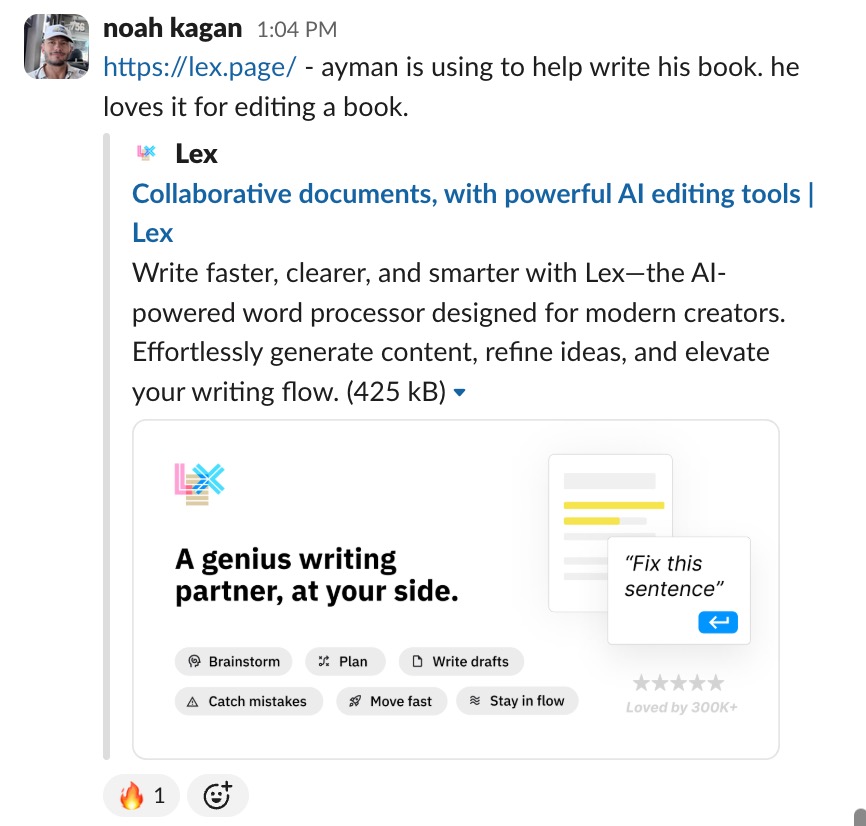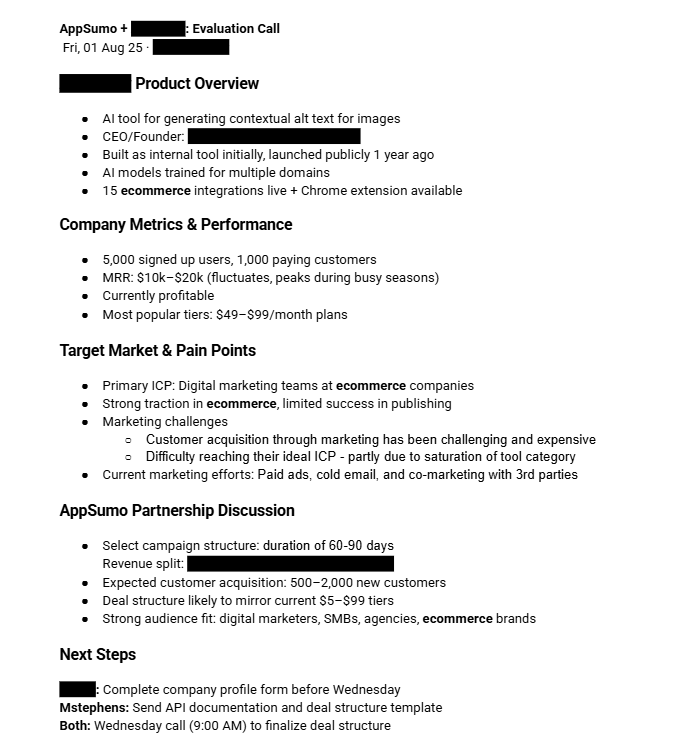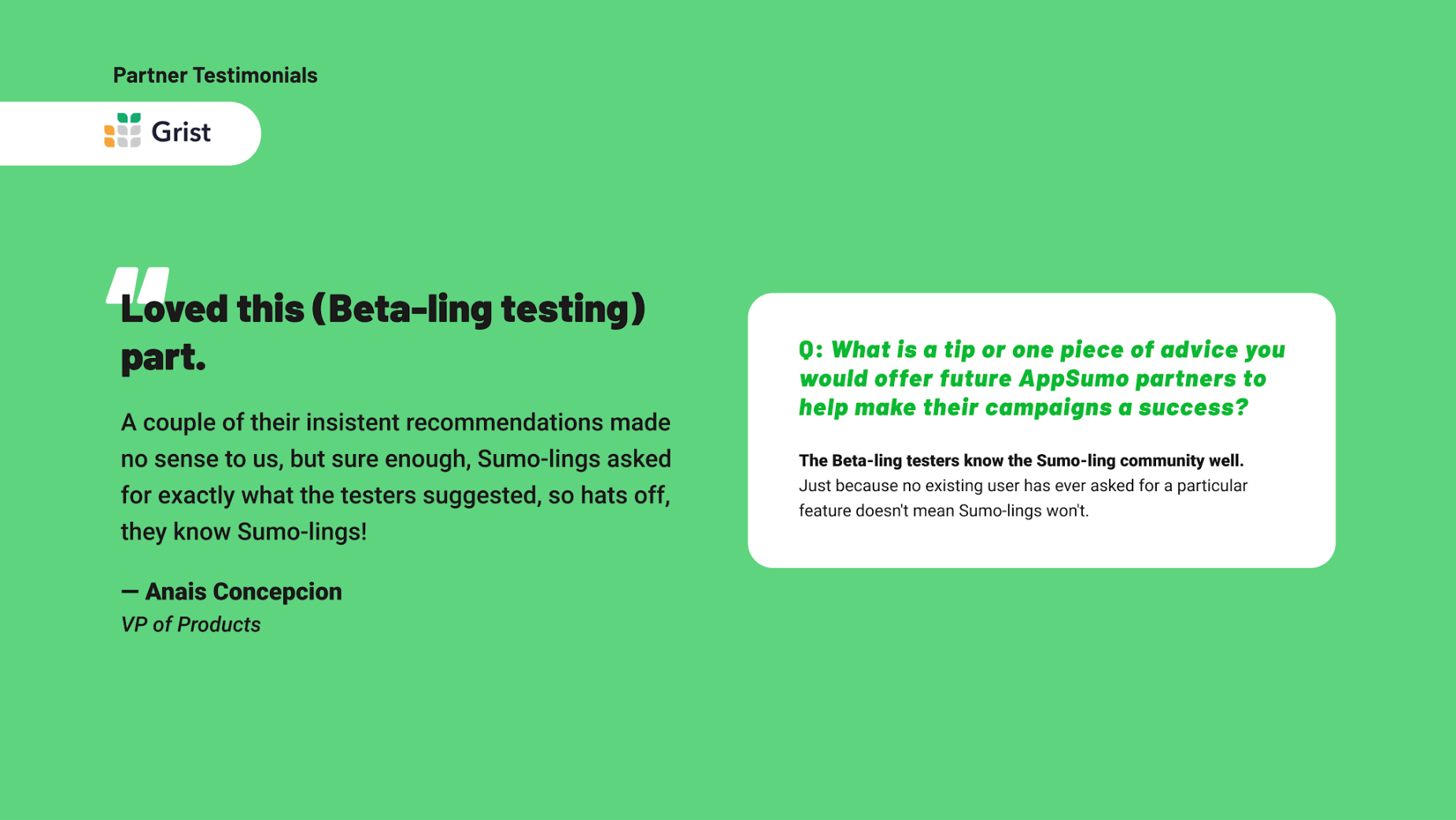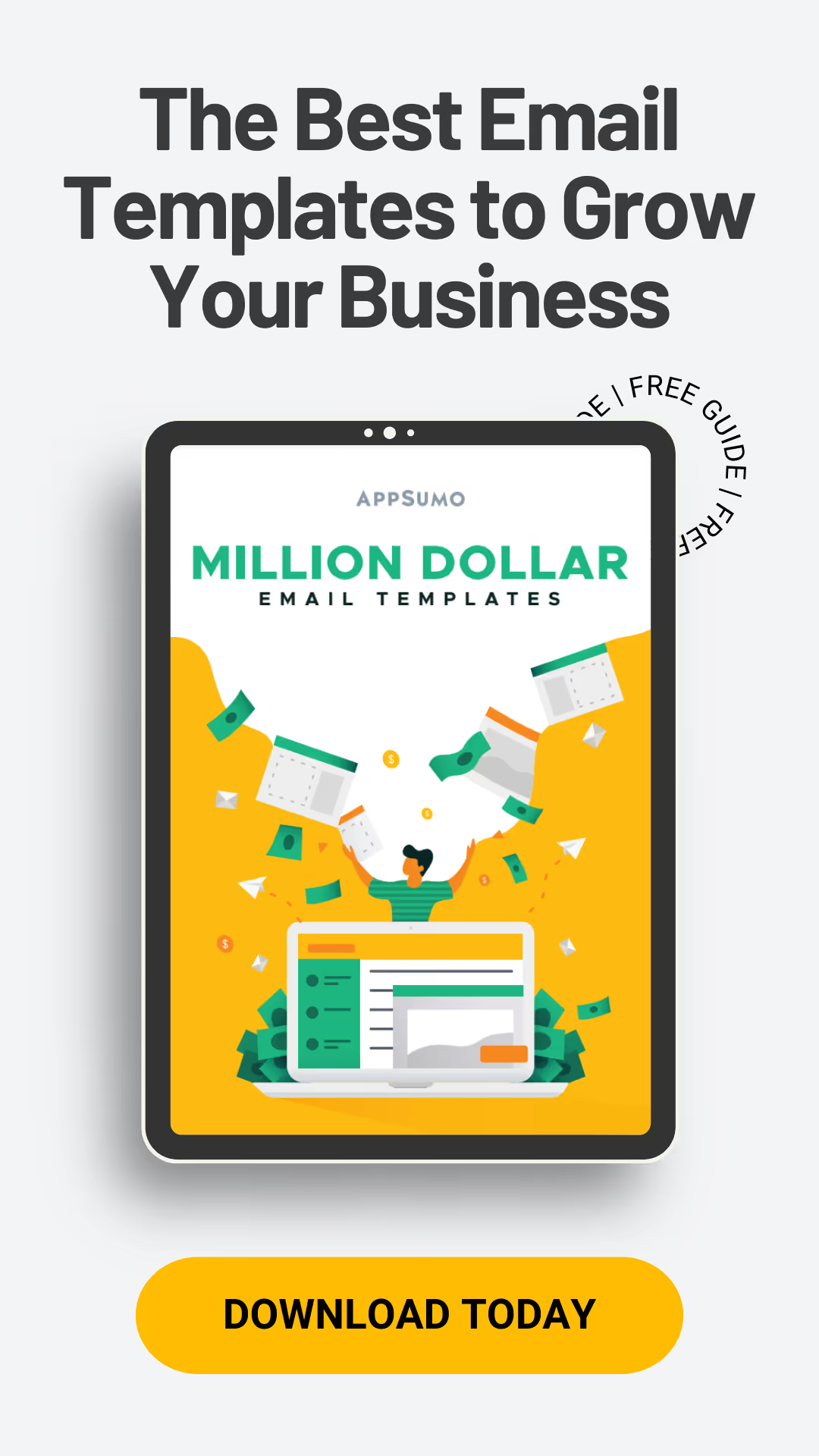Introduction
One of the most unique things about shopping on AppSumo is the direct communication and relationship you build with our founder partners. Yes, you get a great deal, but you also get in on the ground floor of a tool and invest early. That comes with the expectation that we’ve done the homework to make sure the people you support have been vetted—and we take that seriously.
In recent months, we’ve heard your feedback loud and clear: You want more transparency into how we vet tools, better quality control, and clearer communication about what happens behind the scenes.
So we got to work. We’ve spent the last few months evaluating and optimizing our vetting process to make sure we’re offering you tools we can confidently put our stamp of approval on. In this post, we’ll walk you through the full journey a tool takes before it earns a spot in our Select program, from lead scoring to product testing.
The TL;DR? We source 5,000+ tools each year and less than 5% of them launch on AppSumo. When they do, it’s because we believe they’re worth your trust.
Let’s jump in.
Finding leads
The process kicks off with our lead development reps (LDRs), who research up-and-coming software. They scour LinkedIn, BetaList, IndieHackers, Product Hunt, and more. Plus, we have a dedicated Slack channel for #deal-prospects where the team can share cool tools they come across.

Each LDR sources ~150 tools every month. Leads get added to our HubSpot database to be qualified and our formal vetting begins.
Qualifying leads
After a lead has been identified, it goes through multiple qualification checks:
1. The tool must fit into one of these three categories:
- A trending category or “What’s hot” right now (e.g., AI, lead generation, etc.)
- What AppSumo customers actually want (based on past deal performance + survey data)
- Up-and-coming spaces our customers would be excited about
2. The tool must meet all six of the following criteria:
- Be a software tool or digital product (web app preferred and often required)
- Cannot require a human touch to run (i.e., no agencies/services/manual onboarding)
- Has a paid pricing tier (public pricing page preferred)
- Has a well-developed feature list
- Has clear use case for agencies & small businesses
- Be fully operational (no alpha/early stage beta tools)
Leads that pass these checks get distributed to Business Development Associates (BDAs) for outreach, where they go through the next round of qualification.
Lead outreach
New partners
Once a lead is fully qualified, our BDAs work to find the right contacts. Most partner outreach starts with an email or LinkedIn, but we also use platforms like Discord, TikTok, Reddit, Twitter, Facebook and Instagram.
Once a partner replies, BDAs book the meeting and prepare precall notes for our Business Development Managers (BDMs).

Repeat partners
Our team also curates leads from previous AppSumo partners. We prioritize building healthy, sustainable relationships with our partners, many of whom come back to run 2-4 campaigns after their initial launch.
To launch again on AppSumo, repeat partners must meet the following criteria:
- Refund rate below 30%
- Average taco rating of 4+
- Passes our partner stability calculator (more on that later)
- Passes Beta-ling testing (more on that later)
- Shows sustainable business growth since their last AppSumo campaign, with product enhancements or feature additions.
Here’s what we don’t accept for repeat partners. Partners who:
- Break our review incentive policy or encourage Sumo-lings to refund and buy directly from them
- Pull bait-and-switch tactics. We don’t want bad actors who change their terms or misrepresent what they are selling. (We also flag partners who seem likely to do so.)
- Offer a better deal on another platform. First, we ask them to remove it. If they refuse, we’ll terminate our partnership.
- Go non-responsive on customer support. Partners must be available to our Sumo-lings during and after their campaign.
Editor’s note: We know that you may have had an experience with a repeat partner that did not align with the criteria laid out above. We have doubled down on our standards, and are more diligent in screening repeat partners. If you’ve experienced an issue with a repeat partner from June 2025 onward, please write in to support@appsumo.com and let us know.
It’s not uncommon for Sumo-lings to wonder why a partner is returning for multiple AppSumo launches. But repeat launches aren’t always about a revenue boost. Many founders, like Brilliant Directories, come back because they’ve shipped major updates or added new features they’re excited to get feedback on. Others return after experiencing a wave of momentum, with more traffic, more word-of-mouth buzz, and more attention from their last launch.
And sometimes, Sumo-lings themselves are the ones driving the comeback! We regularly hear from partners whose inboxes are full of customer requests asking when they’ll return to AppSumo.
Prospective partner calls
Once a meeting is on the books, our Business Development Managers (BDMs) will have a call with the partner to further assess their potential fit for AppSumo. From there, they spend weeks building a relationship with the partner’s team through ongoing calls and emails. During these weeks, BDMs continue vetting the product.
There are several types of questions BDMs must ask founders during their sales calls, including:
- Year founded: Whether the product is new or established, we ask if there’s sustained momentum and recent market interest.
- Number of employees/company structure: Is this a side hustle or a partner’s full focus? Will the partner be able to sustain an AppSumo launch? Is development handled in house, and not by contractors or freelancers?
- Number of customers (paid vs. free): We look at the number of paid customers to gauge traction. Free users are fine, but a clear path to conversion (or proof of it) is key. We consider the MRR and financial health of our partners before their AppSumo launch and hold off on building partnerships until we see proof of stability.
- Partner goals: We ask about the partner’s top priorities to understand intent. We flag any campaigns mainly seeking survival revenue vs. strategic growth.
- Revenue allocation: We ask how partners plan to use campaign revenue. Ideally, it's reinvested into growth, not just covering salaries or personal payouts.
- Current marketing strategy: We ask about go-to market efforts and plans to assess demand. If their current marketing shows zero conversions, it may signal low interest or lack of strategy.
- History of success: Do they own other successful products? Do they have any other revenue streams, like agency work or consulting? What about funding rounds, investments, or grants?
Common red flags we look for:
- Having less than 12-24 months of runway (little to no MRR or mostly one-off revenue from sources like LTDs)
- Being part of a competitive market with no strong differentiators or unique value proposition
- 1-2 person teams that treat the tool as a side project and have purely revenue-focused priorities. These partners typically can't leverage community feedback or scale effectively after a customer influx.
We use the above to filter out partners who are either launching for the wrong reasons or don’t appear to have the ability to sustain customers beyond the launch. The remaining tools are ready to move onto the next round!

Partner stability
During conversations with partners, BDMs dig into financial stability. Partners must have the financial runway to survive and thrive beyond their AppSumo promotion.
We created a partner stability calculator to help us determine if a company is financially stable enough to offer a deal on our platform. By collecting major financial inputs (e.g., subscriber count, MRR, growth rate, operating expenses, overhead, cash burn, and funding history), we can forecast the company’s financial health over the next 24 months, both with and without an AppSumo deal. This calculator gives us a data-backed view of whether a partner can sustainably support AppSumo customers after their campaign.
If the partner does not meet our thresholds or criteria for product viability, we pass on them. Only about 1 in 4 of the partners we talk to qualify for negotiations.
Crafting the offer
We only begin crafting an offer after a partner has passed all of our quality checks, we’re confident in their financial runway, and we know the product is a strong fit for the AppSumo community. We want to be sure that even before the contract is signed, the deal provides value to AppSumo customers, the partner, and our platform.
One of the most important pieces to crafting a good offer is pricing. Customers need to be getting an amazing deal on a quality tool—no exceptions.
Each new product should meet the following pricing guidelines:
- Compelling benefits: Products should offer strong value that helps solopreneurs start or grow their businesses.
- Better value than the original plan: Products should offer clear savings. Each product page shows what it would cost to subscribe to an annual plan with similar features and limits. That way, customers can easily compare it to the lifetime deal and understand why it’s a no-brainer.
- Standout tools: Features should be robust enough that no free alternatives can be found elsewhere.
In the partnership agreements, we also outline:
- Deal structure: This includes a guarantee that the product/deal includes all future updates to the plan offered. If the plan names ever change, the lifetime plan will receive the updates and features of the plan it most closely resembles.
- Deal terms
- Terms & conditions
- Payment & partner promotion program
- Revenue share (this is always negotiable)
- A link to the AppSumo partner terms
We work hand in hand with partners to create an offer that benefits both their company and AppSumo customers. This is a collaborative process and each contract looks different depending on each partner’s goals and needs.
Product functionality testing
After the contract is signed, the product gets passed along to an unbiased third party to determine if it meets our functionality criteria: our Beta-lings. The goal is to make sure tools meet our standards for quality, usability, and value—at the end of the day, they should actually do what they say they’ll do on the deal page.
The Beta-ling program is AppSumo’s internal testing initiative where power users and software experts test tools before launch. Beta-lings review tools using a structured template, evaluating UI/UX, features, integrations, and pricing. They collect feedback in testing surveys across a wide range of areas, then we generate an overall composite score that helps us decide if a tool gets a place on our launch calendar.

Beta-ling insights often influence product roadmaps and help partners improve before going live. These folks are experienced AppSumo users—entrepreneurs, freelancers, marketers, and developers—who have very high standards.
Each section has its own rubric, but roughly speaking, it looks like this:
1 = This is not a product we would want to launch
2 = This is a below average product, major adjustments needed to launch
3 = This is a solid product, though a few adjustments are needed to launch
4 = This is an excellent product, minor adjustments needed to launch
5 = This is a perfect product, no adjustments to launch

We’ve found that tools with higher Beta-ling scores tend to have higher reviews in our store as well.
Examples:
- Acumbamail: 4.25 Beta-ling score → 4.75 tacos on deal page
- Meetn: 3.75 Beta-ling score → 4.5 tacos on deal page
- Krisspy: 3.75 Beta-ling score → 4.5 tacos on deal page

Here’s what Beta-lings don’t accept:
- Listings for unoriginal products
- Boilerplate SaaS with very little customization or differentiators
- Unsecure apps
- Scammy affiliate tools or courses that encourage shady tactics or teach people how to game systems.
- Dropshipping products
Bottom line: The product must have functional and valuable features.
Once a tool passes all Beta-ling checks, it’s ready to launch!
You know how the rest goes. 🙂
Conclusion
Our vetting and launch process is designed to balance quality, value, and sustainability. But even with thorough checks, no system is foolproof. Startups are inherently risky.
Our goal at AppSumo is to minimize that risk for customers while setting partners up for long-term success.
Is our process perfect? Not yet. But we’re constantly improving it as the software landscape evolves, with your feedback at the center of every update.
With every tool we launch, we’re committed to delivering real value and supporting growth on both sides. It’s a high bar, but that’s what makes every successful launch all the more rewarding.
As our partner Abu Huraira (founder of WPSubscription) put it:
“To other solo founders thinking about AppSumo:
If you want signal, support, and early growth, then this is it. But be ready to ship fast and listen harder.”
Think you’ve got what it takes to be part of AppSumo Select? Apply here.
Anything we didn’t cover that you want to learn more about? Comment or email us at support@appsumo.com. We read every single message and want to hear from you.




